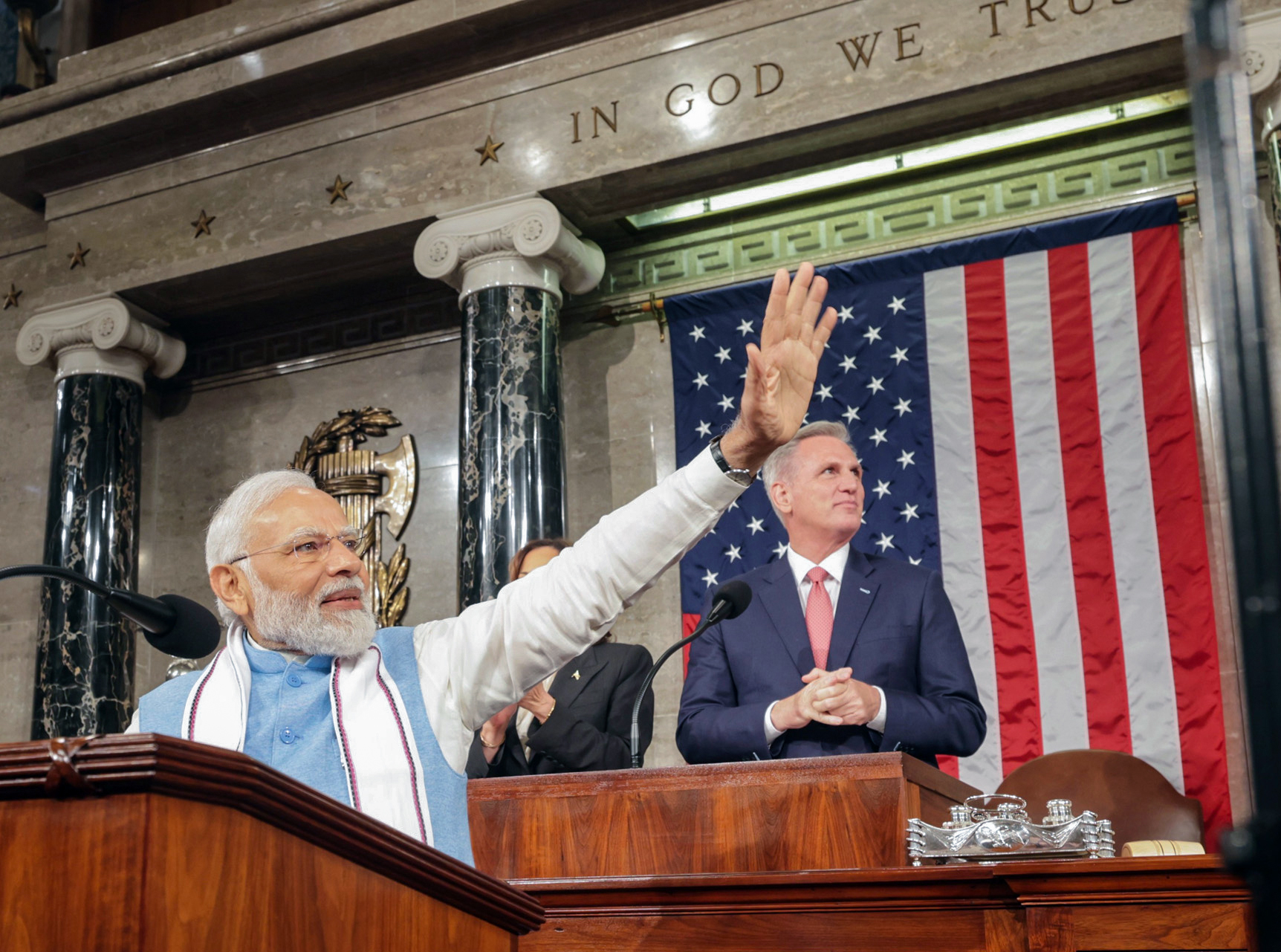President Biden made clear that he sees India as vital to helping preserve the Western-led global international order, a set of rules-based principles and values that China is seeking to challenge. This observation is also being seen by diplomats as a significant marker of PM Modi’s visit being fruitful and successful.
New Delhi
Prime Minister Narendra Modi concluded his State visit to the United States, with his “hands full of strategic gains”. While President Joe Biden and PM Modi in the joint statement issued after the bilateral meeting on Thursday categorically sent out a stern message to China over its belligerence and aggressive behaviour, the two leaders also called out cross-border terrorism in a clear signal to Pakistan. “That the joint statement underlined the need to respect sovereignty and territorial integrity of states should also be seen as a strong message to China in the context of its aggression at the Line of Actual Control (LAC) in eastern Ladakh and Arunachal Pradesh,” a diplomatic source told The Sunday Guardian.
“Biden and Modi discussed the China factor vis-à-vis Arunachal Pradesh and Ladakh during their talks in Washington. Those raising doubt over this are absolutely wrong. They discussed the PLA’s misdeeds along the LAC. The joint statement is self-explanatory for that,” a source claimed, describing it as a diplomatic victory for the Indian side.
The Indian diplomats who have been privy to meetings and interactions in Washington say that it is also a big diplomatic triumph and gain for India that Biden defended calling Chinese President Xi Jinping a “dictator” during a joint press conference with PM Modi. Biden said his blunt statements about China are “just not something I’m going to change very much”.
Biden and Modi emphasised the importance of “rules-based international order”, saying “the contemporary global order has been built on principles of the UN Charter, international law, and respect for sovereignty and territorial integrity of states.” “The United States and India reaffirmed their resolve to counter any attempts to unilaterally subvert the multilateral system.” The diplomats here in New Delhi ask, “Do we need more evidence after these observations in the joint statement that show that China has been given a sufficient dose of message for its aggression at LAC?” The two leaders “reiterated their enduring commitment to a free, open, inclusive, peaceful, and prosperous India-Pacific region with respect for territorial integrity and sovereignty, and international law,” while expressing “concern over coercive actions and rising tensions” and opposition to “destabilizing or unilateral actions that seek to change the status quo by force.” Modi and Biden “emphasized the importance of adherence to international law, particularly as reflected in the United Nations Convention on the Law of the Sea (UNCLOS), and the maintenance of freedom of navigation and overflight, in addressing challenges to the maritime rules-based order, including in the East and South China Seas.” “This is again another set of strong messages for China in the joint statement,” a diplomat said, analysing the bilateral document.
Addressing the Indian diaspora, PM Modi also separately sent a strong signal to China from the soil of the US, saying “The dark clouds of coercion and confrontation are casting their shadow in the Indo-Pacific. The stability of the region has become one of the central concerns of our partnership.” Diplomats say that it was a message for Biden as well. “Modi sought to suggest that India is ready to be its partner in countering China in the Indo-Pacific, and the US must also be ready to address its concerns along its northeast borders amid Chinese illegal activities,” a diplomatic official explained.
In what is being counted as another major strategic gain for India, PM Modi brought the US into the India matrix, as a result of which the Biden administration agreed to work with India in space, semiconductors, farming, artificial intelligence, energy and education, healthcare and humanitarian efforts. The joint US-India statement also said, “Biden and Modi strongly condemned cross-border terrorism, the use of terrorist proxies and called on Pakistan to take immediate action to ensure that no territory under its control is used for launching terrorist attacks”. Sources see it as another diplomatic achievement for India that Pakistan was slammed by both leaders. Pakistan was obviously rattled by the statement, as was evident from a quick angry reaction from Islamabad. Pakistan’s foreign ministry criticised US and India, saying the joint US-India statement was “unwarranted, one-sided, and misleading”. “The reference to Islamabad in it was contrary to diplomatic norms,” it said.
Sources who are in close contact with diplomats in Beijing told The Sunday Guardian that the joint statement has sent shockwaves across the power corridors in China as well. “The Chinese government is expected to come up with a terse reaction sooner or later,” said an official. India and the US affirming their vision of being among the closest partners in the world will also not go down well with China.
On the issue of Afghanistan, President Biden reaffirmed India’s stand. He stressed the need for the formation of an inclusive political structure in Kabul. The joint statement said Biden and Modi expressed commitment to continue close consultations on the situation in Afghanistan. “The leaders emphasised the importance of formation of an inclusive political structure and called on the Taliban to respect the human rights of all Afghans, including women and girls, and to respect freedom of movement,” the statement reads.
Modi and Biden urged the Taliban to abide by UNSC Resolution 2593, which demands that Afghan territory should never be used to threaten or attack
Biden made clear that he sees India as vital to helping preserve the Western-led global international order, a set of rules-based principles and values that China is seeking to challenge. This observation is also being seen by diplomats as a significant marker of Modi’s visit being fruitful and successful in terms of strategic gains and deepening of US-India strategic ties.

